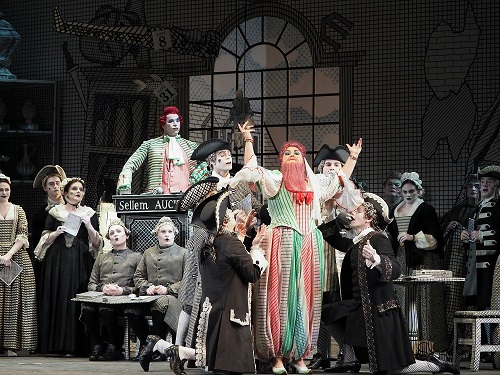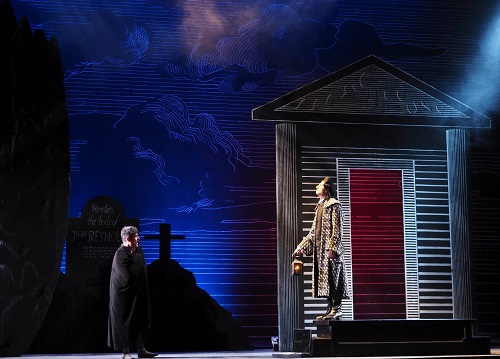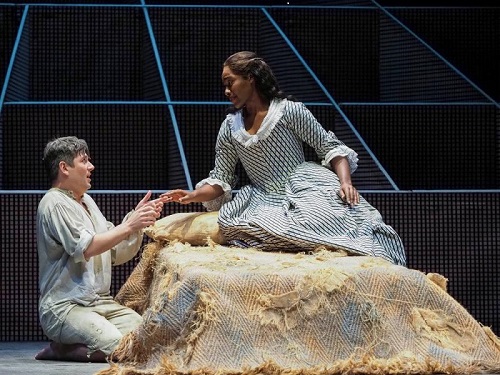John Cox and David Hockney’s Glyndebourne production of The Rake’s Progress has proved one of the Festival’s most enduring successes, revived frequently in the Sussex theatre and in international houses since its 1975 premiere. It’s on the road again, this time as part of the travelling trio of operas forming Glyndebourne’s 2021 autumn tour, the first stopover being the Marlowe Theatre in Canterbury.
As is well-known, the seeds of the opera were born when, in 1947, Stravinsky visited an exhibition at the Chicago Art Institute of Hogarth’s eight ‘modern morals’ paintings, depicting – in keeping with the literary convention of the Restoration rake – the rise and fall of one Tom Rakewell, a poor country lad turned newly enriched libertine, whose dissolute progress takes him from the brothel to the debtor’s prison, on to Bedlam, and finally death. Hockney’s precise criss-cross hatching draw on the engravings which the entrepreneurial Hogarth produced and printed in 1735, and are as allusive as Stravinsky’s neoclassical score, incorporating, too, captioned quotations from W.H. Auden’s deliciously wry libretto.

Delicate pastel ‘watercolour’ enlivens the pen-and-ink etching, the ‘coolness’ setting off the splashes of complementary brightness – innocent green and daring red –which are in turn enhanced by Robert Bryan’s brilliant lighting. The latter can make the two-dimensional spring to life, as when both the gracious exterior of the London house own by ‘T. Rakewell Esq.’ and its glowing interior are simultaneously lit. As the progress proceeds the colour ebbs, fading to monochrome juxtapositions which confirm Tom’s moral decline and deliverance. And, if the black and white canvas flats and cloths afford a certain moral distance, then the vivid costumes of Anne, Baba the Turk and Sellem humanise Hockney’s ‘cartoons’. The designs have lost none of their charm, even if it is unfortunate that they necessitate longueurs between the scenes which disrupt the inevitability of the protagonist’s dissipation as conveyed by the harmonic scheme of Stravinsky’s score.
It’s serendipitous that conductor Kerem Hassan is a protégé of the recently and sadly deceased Bernard Haitink who conducted the premiere run of this production. Kerem keeps the rhythms light and fleet, and the textures lucid, as Stravinsky’s wind-dominated sonorities form an engaging but not intrusive aural complement to the delightful visuals.

This run re-unites tenor Frederick Jones and bass-baritone Sam Carl, as the disreputable rake and his dark nemesis, Nick Shadow, and their interpretations of the roles which they performed so persuasively in British Youth Opera’s 2018 production are here further refined and deepened. Jones’s relaxed, warm tenor, which has lyricism and strength at the top, gives Tom a lovely confidence and optimism – as in the opening scene when he guilelessly believes his dreams will come true, and later, when Shadow’s bread-making machine seems to offer him an opportunity to right wrongs and do good. This rake reflects little and acts fasts, with impetuous hopefulness. Both Tom’s weary resignation in the face of Baba’s hysterical porcelain smashing – he offers up the final plate with a stoic shrug – and his agonising regret in the graveyard scene are convincing, and conjure our sympathy.
Carl’s tall looming Shadow can be both unctuously urbane and menacingly manipulative, and if he shows concern and care for Tom as he encourages him to embark on his adventures, then there’s a darkness underpinning his encouragements which anticipates his later ruthlessness. Shadow’s defeat in the graveyard scene, when true love intervenes, and his subsequent vengeful destruction of Tom’s sanity are powerful theatre.
That ‘true love’ is vibrantly embodied by Nardus Williams’ loyal Anne. I sometimes found Williams’ rapid vibrato a bit fluttery, but she captures Anna’s shining innocence and her decision to follow Tom is joyful and energised, the angular leaps and choppy phrases gracefully executed, the high peaks clear and ringing. She brings fine poise and sensitivity to the final scene, too, shocked as Anne is by Tom’s irreversible insanity.

As Sellem, Daniel Norman’s precision and clarity whips up the prurient punters at the auction, and this scene is a real treat, the over-excitement and opportunistic materialism overspilling into perfectly choreographed chaos. In the brothel, Fiona Kimm’s Mother Goose presides with prowess over the languorous lechery, and this scene – its parodic, rhythmically askew ‘Lanterloo’ dance brilliantly executed – epitomises the rigour and bite of the Glyndebourne Chorus. Jack Sandison steps forward from the Chorus to sing the Keeper of the Madhouse, explaining to the alarmed Anna that Tom’s delusion that he is Adonis is harmless. Stephen Richardson is a genial Father Truelove.
Finest of a fine cast is Rosie Aldridge as Baba the Turk. This Baba relishes her role as ‘theatre’ and her lovely singing makes us eager guests at the spectacle. Her demands, debacles and facial décor are as outrageous as the role’s vocal virtuosity, which Aldridge’s despatches with ease and appeal.
The diction in the arias, recitatives and choruses is pristine, and Stravinsky’s wit and acerbity are balanced by an engaging humanity. The before-the-curtain moral at the close is both Mozartian and modern, confirming that love and money continue to tussle for the top spot in the ranking of human desires. No wonder the large Canterbury audience were warmly appreciative. If this Rake roves in your vicinity, catch it if you can.
The 2021 Glyndebourne Tour continues until 10th December, visiting Milton Keynes, Norwich and Liverpool.
Claire Seymour
Anne Trulove – Nardus Williams, Tom Rakewell – Frederick Jones, Father Trulove – Stephen Richardson, Nick Shadow – Sam Carl, Mother Goose – Fiona Kimm, Sellem –Daniel Norman, Baba The Turk – Rosie Aldridge, Keeper of the Madhouse – Jack Sandison; Director – John Cox, Conductor – Kerem Hasan, Designer – David Hockney, Lighting Designer – Robert Bryan, The Glyndebourne Chorus (Chorus Director, Aidan Oliver), The Glyndebourne Tour Orchestra (Leader, Richard Milone).
Glyndebourne Festival Opera, The Marlowe Theatre, Canterbury; Wednesday 3rd November 2021.